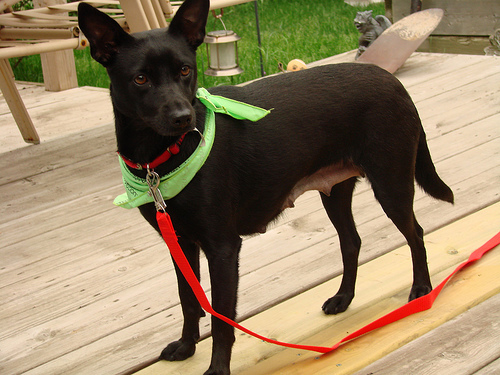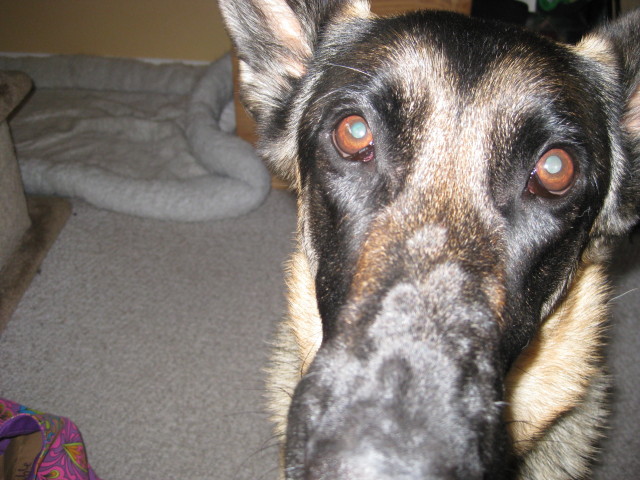QuestionHi,
I just adopted, yesterday, Roxy an elderly dog of 8/9 yrs old. She is a shepard/terrier/? mix, she is lovely. She is very well-mannered! Up to date on her shots, I have access to her previous medical records, I am familiar with the vet. Her previous owners did not use dry food in her diet, I prefer to mix dry w/ wet. I bought pedigree senior dry food and joint/immunity wet. I also purchased pedigree tartar build up chews. I had her groomed today, she is short-haired, 60lbs, teeth brushed, groomer found 2 rotting teeth. So we will already be making a trip to the vet asap. My question for you though is nutrition. Is what I am doing ample? Should I use supplements (I did see joint health chews etc), what is the best elderly dog formula, what are the best supplements?. What is the best anti-flea formula for sensitive skin? How often should I brush her teeth? We did three walks today and she had MAJOR problems keeping up. How much exercise does an elderly dog, who walks very slow, need? She has been cooped up in a kennel for 6+ weeks and prior to that a house alone for 4 weeks so I can tell she is sore after yesterday and today. Is one walk good? Let her take the lead? Any other advice would be great- we LOVE her already!!
Answer
Hi Kelly,
It's good you asked about tooth brushing. After your dog's teeth have been examined by your vet, extractions may be required, and the doctor will probably scale your dog's teeth, as a dentist hygienist would clean yours. Once the professional cleaning has been done, is a great time for you to begin to brush your dog's teeth. This is really very simple to do, and is a much better way to keep your dog's teeth clean, than feeding him any sort of biscuits. Brushing your dog's teeth also allows you to see any little problems in your dog's mouth before they develop into bigger problems. You can read more about how to brush your dog's teeth here:
http://www.petplace.com/dogs/how-to-brush-your-dog-s-teeth/page1.aspx
Ideally, a dog's teeth should be brushed daily, just like your own.
If you're changing your dog's diet, you should do so gradually, over a period of 5-7 days. Changing a dog's diet too quickly can cause stomach upsets, or diarrhea. A good rule of thumb is to feed your dog the very best food you can afford. Pedigree Senior dog food contains "Animal Fat", which is an unidentified source of fat. Ideally a dog food should contain no mystery ingredients of any kind. Better quality foods would have a named sources of fat and meat, such as Chicken, Beef, or Lamb. Pedigree Senior is preserved with the artificial preservatives BHA/BHT. These are preservatives banned in several European countries, and Japan, though they're are legal to use in the USA. Being legal doesn't make them healthy. Better quality dog foods are naturally preserved with "mixed tocopherols" (Vitamin E). Pedigree Senior dog food also contains artificial dies, and numbered food coloring (Yellow 6, Yellow 5, Blue 2, Red 40). Better quality dog foods contain no artificial colors (they're for you, not for your dog anyway!) no added sweeteners, or salt.
In general, if your dog has no medical problems, is not overweight, and is active, she may remain on a regular "adult" dog food. You should talk to your vet about if your dog would benefit from a senior diet, at this time in her life.
"The best" dog foods can't be found at the supermarket, the supermarket brands that you may want to consider are Newman's Own and Harmony Farms. You'd need to shop at one of the larger pet stores, or feed stores to find the best dog foods. A few of "super premium" dog foods to consider are:
Wellness Senior SuperMix5
Flint River Ranch Senior
NutriSource Senior Dog
Blue Buffalo Longevity Formula
Wysong Senior
Innova Senior
If you'd like to read more on how to identify good ingredients from bad, read here:
http://www.dogfoodproject.com/index.php?page=betterproducts
If you'd like to compare brands of dog foods by the ingredients they contain, read here:
http://www.naturapet.com/tools/comparison.asp
Almost no dog food is going to contain therapeutic levels of glucosamine and chondroitin, the supplements most often recommended to help retain healthy joints in dogs (and people). You're better off giving your dog a separate supplement. Glucosamine combined with chondroitin, can be purchased in health food stores, at veterinary clinics, and in pet supply catalogs. Products that contain human grade glucosamine and chondroitin are much more likely to be of high quality and in a purer form. In addition to ingredients, the concentration of actual glucosamine and chondroitin vary from product to product. Products designed for dogs often have ascorbic acid or manganese to help aid in the uptake of glucosamine in a dog's body. This supplement needs to be given daily for at least a month before it's benefits may be seen, and mobility improves. It does not control pain. If your dog is showing signs of joint pain, pain relief medication should be continued during that first month of glucosamine and chondroitin use. Then you can decrease the amount of pain medication to see if there is improvement in her condition. At that time, your dog may require no pain mediation, or just need pain medication less often, there's no way to guess. If the glucosamine and chondroitin supplement is discontinued, joint damage will resume in a matter of weeks.
You didn't say if your dog is out of condition, or if her joints hurt too much to keep up with you on walks. Walk shorter distances will help with both. Let your dog set the pace for how fast to walk. As your dog gets into better condition, she'll be able to walk further, and enjoy the walks more. Keeping your dog's weight down, is probably the single best thing you can do, if she's having joint pain. Daily low impact exercise (such as short walks) will improve her mobility and strength. Depending on your dog's condition, a walk to your mailbox and back might be as long a walk as you should do, at first. Longer walks will only aggravate her condition. As your dog becomes more fit, she'll be able to walk longer distances, just like a person who's getting into shape. You should talk to your vet about what kind of medication your dog may require for pain and inflammation. Many dogs get relief from buffered aspirin, some need something a stronger anti-inflammatory pain medication. Either way, your dog should be on medication if she is in pain.
Some dogs benefit from acupuncture for relief of joint pain. This might totally control pain, or some pain medication may still be needed. You can locate a veterinary acupuncturist here:
http://www.ivas.org/Members/VetSearch/tabid/124/Default.aspx
http://www.aava.org/php/aava_blog/aava-directory/
http://www.holisticvetlist.com/#search
You didn't say what makes you think your dog has a skin sensitivity. Generally, the safest and most effect flea preventative medications are the ones you get from your vet's office: Frontline, Advantage, Revolution, and Program. Sentinel is one flea preventive that's available as a one a month oral mediation (called a Flavor-Tab). Sentinel also prevents Heartworms, so it's handy to treat for both fleas and Heartworms in one tablet. Two other oral flea products (that don't prevent Heartworms) are Comfortis, and Capstar. Comfortis kills fleas and prevents flea infestations, Capstar will only kill fleas that are on your dog, it won't prevent new fleas from hopping on her.
I think I addressed all of your question, if not feel free to write back.
Best of luck!
Patti

 AKC
Question
Bailey and Cocoa
Hi Im Ashley Sommer. I am ten
AKC
Question
Bailey and Cocoa
Hi Im Ashley Sommer. I am ten
 Guessing my dogs mix
Question
matilda
I was wondering if you could help what
Guessing my dogs mix
Question
matilda
I was wondering if you could help what
 bumps on dogs nose
Question
bumps on nose
My dog has bumps on her nose..Sh
bumps on dogs nose
Question
bumps on nose
My dog has bumps on her nose..Sh
 Puppy help? does this look like a nice quality puppy?
Question
3 weeks old
im getting this blue nose puppy so
Puppy help? does this look like a nice quality puppy?
Question
3 weeks old
im getting this blue nose puppy so
 Puppy wont come!
QuestionCapone & Rascal
QUESTION: Help! &nbs
Puppy wont come!
QuestionCapone & Rascal
QUESTION: Help! &nbs